The Presidential election results will be announced on 21 July, and the new President will take oath on 25 July.

NDA's Droupadi Murmu vs Opposition's Yashwanth Sinha. Who will be India's next President? (PTI)
The elections to choose the 15th President of India — a contest between the National Democratic Alliance’s Droupadi Murmu and the Opposition’s Yashwant Sinha — concluded on Monday, 18 July.
According to the Election Commission, over 99 percent of a total 4,796 electors — Members of Parliament and Members of Legislative Assemblies of states and Union Territories — cast their vote.
A full 100-percent voting by MLAs was reported from 11 states and one Union Territory: Kerala, Karnataka, Tamil Nadu, Chhattisgarh, Goa, Gujarat, Himachal Pradesh, Madhya Pradesh, Manipur, Sikkim, Mizoram, and Puducherry.
The election results will be announced on 21 July, and the new President will take oath on 25 July as per the schedule released by the Election Commission.
Going by the numbers, Murmu has a clear edge over Sinha owing to the support extended by several parties like the YSRCP, AIADMK, JD(S), BSP, BJD, Shiv Sena, Shiromani Akali Dal, and JMM.
Murmu’s identity as a tribal leader helped the NDA garner support even outside its fold because, if elected, she will become the first tribal woman to hold India’s top constitutional post.
However, ahead of the polls, Sinha appealed to all parties and said the election was “not about the identities of the two candidates in the fray, but about the ideologies and ideals they represent”.
He urged the parties to vote in favour of him irrespective of their affiliations in order “to save the Constitution, to save democracy, to save secularism, and to save India.”
My appeal to all members of the electoral college ahead of the Presidential election tomorrow. pic.twitter.com/27JVgwC8ZN
— Yashwant Sinha (@YashwantSinha) July 17, 2022
All 224 MLAs of the Karnataka Assembly and one MP each from the Lok Sabha and Rajya Sabha voted from the state on Monday to elect the next President of India.
The BJP’s 122 legislators, including an independent, cast their votes early in the morning. The state’s Minister for Social Welfare Govind Karjol was first to vote from the BJP.
Led by former chief minister BS Yediyurappa, legislators from the BJP — who were lodged in a luxury hotel over the weekend, purportedly to train them to vote correctly without leading to disqualification of ballots — then headed to the Assembly to vote.
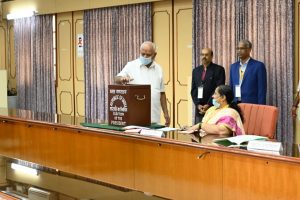
Former Karnataka Chief Minister BS Yediyurappa voted in the Presidential elections. Credit: ECI
The Congress, led by Congress Legislature Party leader Siddaramaiah, cast their votes expectedly in favour of Sinha.
Despite Murmu’s chances, Congress leaders in Karnataka hoped for an “independent, democratic President”.
“May the elected President, who is the first citizen of the country and guardian of Constitution, work in an independent, autonomous and constitutional manner and protect democracy,” tweeted Siddaramaiah after voting.
ಇಂದು ನಡೆದ ರಾಷ್ಟ್ರಪತಿ ಚುನಾವಣೆಯಲ್ಲಿ ನಮ್ಮ ಪಕ್ಷದ ಬೆಂಬಲಿತ ಅಭ್ಯರ್ಥಿ ಯಶವಂತ್ ಸಿನ್ಹಾ ಅವರಿಗೆ ಮತ ಚಲಾಯಿಸಿದೆ.
ಆಯ್ಕೆಯಾಗುವ ದೇಶದ ಪ್ರಥಮ ಪ್ರಜೆ ಮತ್ತು ಸಾಂವಿಧಾನಿಕ ಮುಖ್ಯಸ್ಥರಾದ ರಾಷ್ಟ್ರಪತಿಗಳು ಸ್ವತಂತ್ರವಾಗಿ, ಸ್ವವಿವೇಚನೆ ಮತ್ತು ಸಾಂವಿಧಾನಿಕ ಹೊಣೆಗಾರಿಕೆಯಿಂದ ಕಾರ್ಯನಿರ್ವಹಿಸಿ ಪ್ರಜಾಪ್ರಭುತ್ವವನ್ನು ರಕ್ಷಿಸಲಿ. pic.twitter.com/7Uf0k7uP7O
— Siddaramaiah (@siddaramaiah) July 18, 2022
As for the Janata Dal (Secular), despite being an Opposition party, it chose to back Murmu over Sinha.
The party cited JD(S) patriarch and former Prime Minister HD Devegowda’s push for the women’s reservation bill in Parliament and the prospects of a woman from the tribal community becoming the commander of India’s armed forces as their reasons to support Murmu.
The 89-year-old Devegowda arrived at the Vidhana Soudha in a wheelchair on Monday evening to cast his vote, and all 30 legislators of the JD(S) were expected to have cast their ballots in favour of Murmu.
All 234 members of the Tamil Nadu Assembly cast their votes for the Presidential elections.
The polling was kickstarted by Chief Minister and DMK chief MK Stalin, who arrived at the Assembly shortly after being discharged from the Kauvery Hospital in Chennai following treatment for Covid-19.
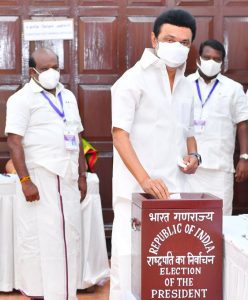
Tamil Nadu CM MK Stalin was first to vote in the state for Presidential polls. Credit: MK Stalin/ Twitter
The DMK had thrown its full weight behind Sinha.
“We have full faith in you to defend our Constitution and offer our unstinted support to your candidature for the post of the President,” Stalin wrote in a tweet following Sinha’s recent visit to Chennai.
The alliance partners of the DMK in Tamil Nadu — including the Congress, VCK, CPI, CPI(M) and the MDMK — also voted in favour of Sinha.
On the other hand, the AIADMK-led alliance in Tamil Nadu supported Murmu.
O Pannerselvam, in his capacity as the AIADMK coordinator — before he was expelled from the party — was part of the NDA delegation that nominated Murmu for the Presidential elections.
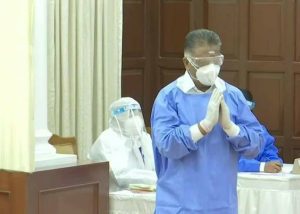
TN Deputy Leader of Opposition OPS came to the assembly wearing a PPE kit to vote in the Presidential elections as he tested positive for Covid. Credit: Special Arrangement
Special arrangements were made at Fort St George by officials to ensure that Minister for Milk and Dairy Development SM Nasar and Deputy Leader of Opposition O Pannerselvam exercised their rights as members of the Electoral College despite testing positive for Covid-19.
Both leaders turned up at the assembly wearing PPE kits to vote before the polling concluded.
Three Lok Sabha members from the state — M Selvaraj, A Ganeshamurthi, and Karti Chidambaram — voted from Chennai after getting permission from the ECI.
All 140 MLAs of Kerala, including Chief Minister Pinarayi Vijayan and Opposition leader VD Satheesan, voted in the Presidential election.
Kerala is the only state where all the elected representatives favoured Sinha.
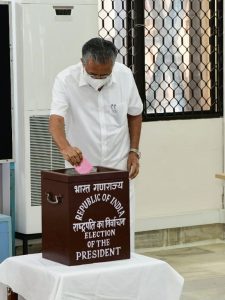
Kerala Chief Minister Pinarayi Vijayan cast his ballot for Presidential polls. Credit: Special Arrangement
However, Neel Ratan Singh Patel, who represents the Sevapuri Assembly constituency in Uttar Pradesh, participated in the voting from the Kerala Assembly after getting requisite permission from the ECI.
A member of regional outfit Apna Dal, he told reporters that he voted for Murmu.
Patel is undergoing ayurvedic treatment in Thiruvananthapuram, and so preferred to cast his vote from the Kerala Assembly.
The DMK’s S Gnanadraviyam, who represents the Tirunelveli constituency in the Lok Sabha, also chose the Kerala Assembly to exercise his franchise.
The Covid-affected MP was the last one to vote. He said he voted for Sinha.
As many as 172 out of 175 MLAs in Andhra Pradesh exercised their franchise in the Presidential election on Monday.
Chief Minister YS Jagan Mohan Reddy was the first to cast his vote as proceedings began at 10 am.
Leader of Opposition N Chandrababu Naidu led his Telugu Desam Party legislators in voting at noon in the polling booth at the Assembly Committee Hall.
Two TDP MLAs, Nandamuri Balakrishna and Gorantla Butchaiah Chowdary, were among the notable absentees as they were reportedly on a foreign visit.
Interestingly, YSRCP MLA Mahidhar Reddy exercised his franchise in Hyderabad.
Andhra Pradesh is likely to be the only state where the ruling and the Opposition parties have supported the candidature of Murmu.
This is also the first time that both rival parties have been on the same page as far as Presidential elections are concerned.
The lone member of actor-politician Pawan Kalyan’s Jana Sena, who switched loyalties to the YSRCP, also extended support to the NDA candidate.
In effect, all 11 members of the Rajya Sabha and 25 members of the Lok Sabha from Andhra Pradesh, as well as 175 members of the Assembly are expected to have voted for Murmu.
In the 119-member Telangana Assembly, the ruling TRS has a strength of 103 MLAs, followed by the AIMIM (seven), the Congress (six), and the BJP (three).
The BJP is the only party which has supported Murmu in the state.
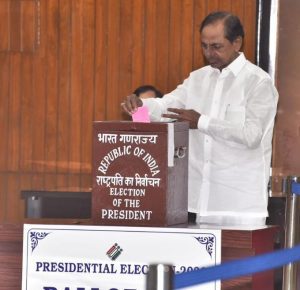
Telangana CM and TRS chief KCR has extended support to Yashwant Sinha in Presidential polls. Credit: Telangana CMO/ Twitter
Though the TRS backed the NDA candidate in the 2017 Presidential election, this time Telangana Chief Minister and TRS supremo K Chandrashekar Rao extended the party’s support to the Opposition candidate.
This comes at a time when the TRS has been hitting out very strongly at the BJP ahead of the state Assembly elections.
KCR has also been accusing the Central government of neglecting the state and holding up its funds.
Further, KCR’s plans to launch a national party ahead of the 2024 Lok Sabha elections are also cited as one of the reasons the party decided to back Sinha.
The TRS leader aims to lead the Opposition’s non-Congress coalition front in 2024, and this move to support Sinha could be seen as a sign of a thaw between the TRS and other Opposition parties.
Interestingly, KCR did not receive Prime Minister Narendra Modi at the Hyderabad airport when the latter flew down to the city to take part in the BJP’s National Executive Committee meeting, and instead chose to accord a grand welcome to Sinha, who was on a tour of Hyderabad the very same day.

May 03, 2024

May 03, 2024

May 03, 2024

May 03, 2024

May 03, 2024

May 03, 2024